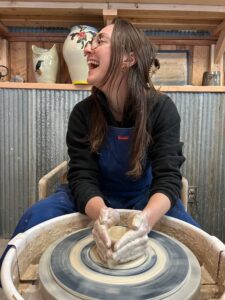A Pottery Student’s Ode to Wabi-Sabi
In the world of pottery, there is a profound appreciation for imperfection – a reverence for the beauty of asymmetry, irregularity, and the natural patina of time. As pottery students, we embark on a journey of discovery, learning to celebrate imperfection as an essential element of our creative process. Join me as we explore the transformative power of embracing imperfection in pottery and honoring the Japanese philosophy of Wabi-Sabi.
The Essence of Wabi-Sabi
Wabi-Sabi is a Japanese aesthetic philosophy that celebrates the beauty of impermanence, imperfection, and simplicity. Rooted in Zen Buddhism, Wabi-Sabi encourages us to find beauty in the imperfect, the transient, and the incomplete, embracing the inherent beauty of life’s imperfections. In pottery, Wabi-Sabi is expressed through the appreciation of asymmetrical forms, irregular textures, and the subtle variations in glazes and finishes.
Embracing Imperfection in Pottery
As pottery students, we are taught to embrace imperfection as a natural and integral part of the creative process. Rather than striving for flawless precision, we celebrate the unique character and authenticity that imperfections bring to our work. Whether it’s a slightly off-center vessel, a spontaneous drip of glaze, or a crack that forms during firing, each imperfection tells a story and adds depth and richness to our creations.
Finding Beauty in the Unconventional
In the pursuit of embracing imperfection, pottery students learn to see beauty in the unconventional and the unexpected. We delight in the spontaneous surprises that emerge during the creative process – the happy accidents and serendipitous moments that add an element of spontaneity and playfulness to our work. By relinquishing control and embracing the unpredictable, we open ourselves up to new possibilities and discoveries.
Cultivating Resilience and Adaptability
Embracing imperfection in pottery is not just about aesthetics – it’s also about cultivating resilience and adaptability in the face of challenges. As pottery students, we learn to accept and embrace failure as an essential part of the learning process, recognizing that it is through our mistakes and setbacks that we grow and evolve as artists. By embracing imperfection, we free ourselves from the constraints of perfectionism and fear of failure, allowing us to take creative risks and explore new avenues of expression.
Conclusion
In a world that often celebrates perfection and uniformity, pottery offers a sanctuary for embracing imperfection and celebrating the beauty of the imperfect. As pottery students, we learn to honor the Japanese philosophy of Wabi-Sabi, finding beauty in the transient, the imperfect, and the incomplete. By embracing imperfection, we open ourselves up to new possibilities, discoveries, and experiences, enriching our journey as artists and individuals. So, let us raise our imperfect creations high and celebrate the beauty of imperfection in all its forms.

